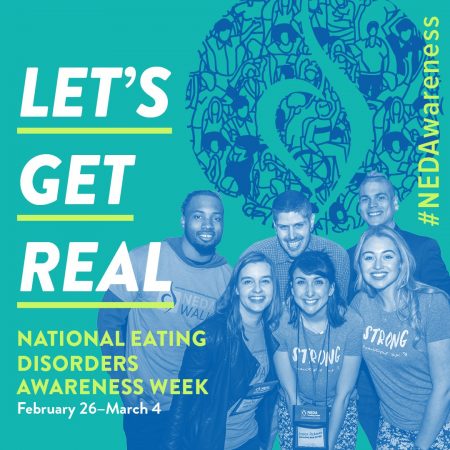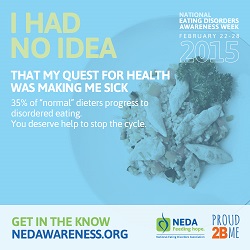 It’s National Eating Disorders Awareness Week and in honor of this year’s theme, “Let’s Get Real,” here are 10 Truths About Eating Disorders you should know:
It’s National Eating Disorders Awareness Week and in honor of this year’s theme, “Let’s Get Real,” here are 10 Truths About Eating Disorders you should know:
1. Eating disorders do not discriminate – they affect people of all ages, genders, sexual orientations, races, ethnicities, body weights, and socioeconomic statuses.
2. You can’t tell if someone has an eating disorder by looking at them.
3. Genetics and the environment both play a role in the development of eating disorders.
4. Eating disorders are not a choice.
5. Eating disorders have the highest mortality rate of any psychiatric illness.
6. You don’t have to feel fully ready to give up your eating disorder to get treatment.
7. Dieting is a common (and preventable!) catalyst for developing an eating disorder.
8. Disordered eating (unhealthy eating behaviors that do not meet the full criteria for an eating disorder) should not be dismissed as “not that bad.” It’s a serious health concern that needs attention and treatment.
9. Full recovery is possible, and the sooner someone gets help, the better the chances of recovery.
10. Recovery isn’t easy, but it is worth it.
 As we celebrate the Fourth of July– often with barbecues and other food-related events – take a moment to reflect on how your relationship with food and weight may be standing in the way of your life, liberty, and pursuit of happiness.
As we celebrate the Fourth of July– often with barbecues and other food-related events – take a moment to reflect on how your relationship with food and weight may be standing in the way of your life, liberty, and pursuit of happiness. It’s National Eating Disorders Awareness Week, and this year’s theme, “I Had No Idea,” focuses on raising awareness about the possible triggers and warning signs of eating disorders. Being able to recognize these signs, symptoms, and contributing factors makes early intervention possible and can prevent a full-blown eating disorder from developing. Early detection and intervention also increases the chances of full recovery.
It’s National Eating Disorders Awareness Week, and this year’s theme, “I Had No Idea,” focuses on raising awareness about the possible triggers and warning signs of eating disorders. Being able to recognize these signs, symptoms, and contributing factors makes early intervention possible and can prevent a full-blown eating disorder from developing. Early detection and intervention also increases the chances of full recovery.


